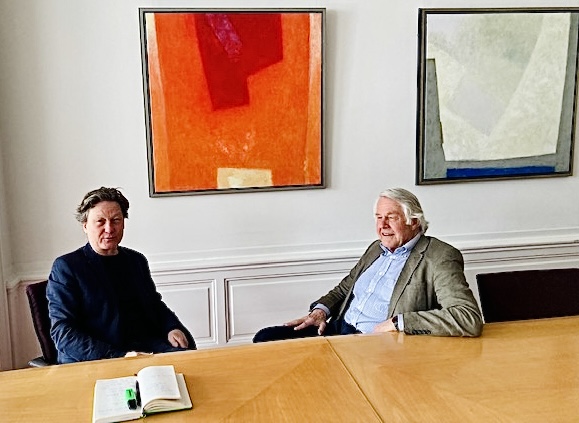Philanthropy back to the drawing board
9 Mar 2023
Following the publication of Rien van Gendt’s book Philanthropy Back to the Drawing Board the author and André Wilkens sat down for an exchange of thoughts on the challenges and outlooks for philanthropy, the need for self-reflection and, ultimately, the relation between philanthropy and democracy.
André Wilkens: You’ve been active in philanthropy for decades. What made you write a book now with a title like that?
Rien van Gendt: This is an era of disruption and I saw how Covid-19 and the war in Ukraine and more to come – let’s say, migration because of climate change or further polarisation in society – force us to go back to the drawing board to see if what we are doing is the right thing to do.

Forget the evidence and do some self-reflection
In philanthropy, people often use the phrase evidence-based philanthropy. What I say is: Forget the evidence and do some self-reflection and have the courage to reconsider the way you do things.
The climate crisis makes foundations wonder about their life-span: “Maybe the planet has a shorter lifetime than the perpetuity of our assets. Should we have the courage to spend more in a time when it is needed?” Others openly stress the interconnectedness between their mission – whether it is in education, health or culture – on the one hand and the wider issues of climate and environment on the other.
The war in Ukraine underlined again how important investigative journalism and an informed society are for our way of living. It caused some foundations to share their data with society, as to counter-act one-dimensional messages.
AW: You are touching at outside factors as the war, the pandemic, and climate change. What internal factors demand from philanthropy to reevaluate what they’re doing?
RvG: Many foundations look upon themselves as being cutting edge and progressive. They know how the world should look like and they invite parties to submit proposals. The ‘don’t call us, we call you’ attitude. In my opinion, this leads to autistic behaviour. It leads to the fact that many foundations don’t have the finger at the bills of society and people start to realise that.
The jewels of your grant making may come unexpectedly
It translates in philanthropy’s try at impact investing. We define the KPIs, we define everything, and we allow others to submit a proposal to us instead of saying: “We trust you, actually. We are prepared to invest in your venture. And we will at a certain point evaluate both the financial and the social returns of it.” If you are an investor and you put money into a company, you would never say: “We fund you, but you can’t spend it on A, B and C. You have to spend it on D, F and G.” And that’s exactly what we do in the foundation world. But the jewels of your grant making may come unexpectedly, by allowing a margin for the unexpected to happen. It does not conflict with wanting to be a thought leader.
I already see a change in partnering with others. For when we think of foundations that want to make a difference, want to become more visible, want to address the global challenges, you have to realise you can’t do it on your own.
Thirdly, reconsidering the endowment as an instrument to bring about change. I have always found it weird that you only use 5% of the corpus of your assets for the public benefit, and you let 95% untouched. Many foundations in the past had separated the head and the heart and even had different instruments for it.
AW: You touch on an interesting trend. Do you see new thoughts about how to actually be 100% foundations, or at least using more of their financial capacity?
Foundations start realising that on the receiving end of society there are needs that may be different in various phases of the life cycle of an initiative, and that foundations have a financial toolbox that is larger than just donations.
In the beginning recipients need donation money to make something investible, angel funding. Later you can move from donations, purely charitable money to recoverable grants, to forgivable loans, to participation in social equity. How beautiful would it be if a foundation could offer recipients tailormade solutions?
AW: Does philanthropy have an image problem?
RvG: The perception of philanthropy has shifted from something principally good, to something increasingly problematic. It is subject to many discussions: ranging from colonialism, via how wealth is created to who spend it. The questions of power, of who makes the rules, of who work in foundations, are reflective of the society we live in.
First of all, research done by Beth Breeze of Kent University distinguishes between distrust towards philanthropists and criticism directed to philanthropy. It is triggered by the ultra-wealthy people in the US, people like Bezos, Musk, and Zuckerberg who entered the philanthropic domain without doing much, or engaging in philanthropy while their business practices can be challenged. Their credibility is being questioned.
The essence of philanthropy; solidarity on the local level
It’s difficult for me that the whole perception of philanthropy is being framed by those people, rather than by what I look upon as the essence of philanthropy; solidarity on the local level. This is not a Western phenomenon, for if you go to Africa or to Asia, you see it in burial societies or temples.
Having said that, I think we should also realise there is criticism to philanthropy as such, because we claim we have added value and that it is good to have private money for the public good. Rutger Bregman or Robert Reich assume that governments have a better view on what is needed in society than private money.
I think there is an added value for philanthropy, not as a supplement for lacking public resources, but in doing things differently: to be the incubator, to be the criticaster of government, to ensure pluriformity in society. But all this assumes you do what you preach and that includes to take risks, to take a long-term perspective, which governments can’t do because they are bound to election periods. The question is: Do we do that?
Then there is a discussion about the source of money, of course, which constantly will be there. If you look at Rockefeller Foundation now, they preach a ‘divest in fossil fuels, invest in alternative energy’ approach, but the original source of the money was Standard Oil. It is easy to look at the past source, or the legitimacy, of money. I rather say: Have a careful look at what we do at this moment and have those discussions with each other.

Philanthropy can only exist in the vicinity of adequate government
When looking at growing distrust toward any institutions in society, there is something about the size of philanthropy which is important. Philanthropy can only exist in the vicinity of adequate government and is not a substitute for government. Adequate governance allows us to do things on the local level and to connect it with the national and global level. But looking at mega foundations there is a danger that you become cliché government, that you move in a direction where you don’t take the risks I think we ought to take as an incubator in society. And then the question is legitimate: “Why do philanthropists not pay more taxes instead of having foundations?” There ought to be a discussion about the size of foundations, in my opinion, and the size of philanthropy.
AW: Well, now Rien, you’re becoming a revolutionary. Interesting thought, an antitrust authority for philanthropy as we have for big companies.
But I want to come back to something you said about wealth creation. How can we turn the discussion about what happened in the past into an opportunity for the future, on how we can make the world a better place? If we look at your example of Standard Oil – which, maybe, has not made the world a better place, and now turns itself into something good – I think it ought to be a positive forward-looking discussion because otherwise we get stuck and then nothing happens with these resources which can be used.
RvG: Let’s say I agree with you. For example, if you look at the fines for Google in Europe, the European Commission could decide this money will not feed the treasury, but be fed back to society in the form of a foundation for culture. It’s a good example of what you mean, I think.
The data industry is producing the new carbon
AW: I’m glad you bring that up. Now with data often being called the new oil, I say: The data industry is producing the new carbon by polluting public space. How can we create a system in which we don’t need to wait until it blocks up the world as carbon now does? Let’s us think about it.
Now we need to cover one more topic at least, and that is Europe. Is there actually a European philanthropy? Or can we develop a European philanthropy, maybe based on your recommendations?
RvG: Maybe the best way to answer is to look at what happens in the US and what happened in Asia. The craft of grant making is further advanced in the US than in Europe. However, the advantage for us is that we live diversity in Europe. I think we should capitalise on a number of our own values, beliefs and characteristics, and diversity is one of them.
Another asset is – looking at Asia – that we have our democratic values, that we have human rights, that we have scientific freedom. In Europe we have the possibility for grassroots organisations to express themselves freely, have their discretionary power, while we still have adequate governance.
There is no European funding
Then the question is, if there is a notion of European philanthropy, which has its own characteristics vis-a-vis other parts of the world, how can one generate European funding for it? I think we should explore the possibilities of creating a European endowment. The European Commission should create possibilities for cultural bonds on the European level that are guaranteed by the European Investment Bank. We should look at the whole array of possibilities to move from national funding to European funding. But the starting point is to define our self in terms of our values and to see these as advantages.
AW: Looking at Europe, there’s quite a diversity also in terms of governance. There are challenges in various countries. In France, every election is sort of a make or break. And you have countries like Hungary and Poland where public space and the space for civil society are shrinking. How do you see this, as there’s no one size fits all approach?
RvG: Firstly, we should stand firm for what I would call European values and translate these into what they mean for philanthropy. I’m very pleased to see the whole issue of investigative journalism and an informed society become more forefront.
Philanthropy is a systems requirement in a democratic system
But a deeper problem is the attitude in which governments don’t look upon philanthropy as a systems requirement in a democratic system. In my view, governments have no monopoly on the public benefit. So, what is long overdue is a discussion on the question: Does one see philanthropy as an asset, or whether, deep down, does one believe there ought to be a monopoly on providing public goods?
